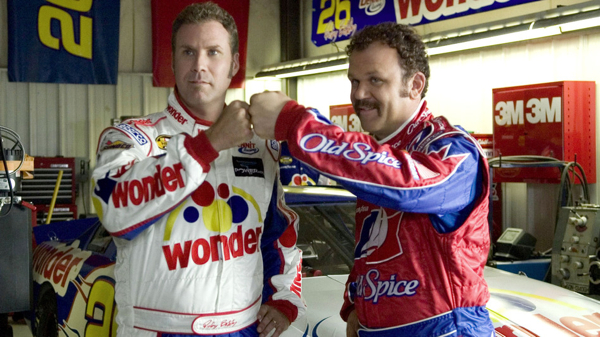Movie review by Greg Carlson
As a follow-up to the Adam McKay/Will Ferrell collaboration “Anchorman: The Legend of Ron Burgundy,” ‘’Talladega Nights: The Ballad of Ricky Bobby” is business as usual – and business is good for the comic team. The world of NASCAR replaces nightly news as the backdrop, and with its red-state appeal and brash patriotic swagger, the racing circuit seems like easy pickings for slapstick and ridicule. “Talladega Nights” provides many opportunities to rib good-ol’-boy culture, but McKay and Ferrell can be credited with allowing many of their characters room to breathe as people, not mere stereotypes. Yes, Ricky Bobby has two first names, but Ferrell continues his uncanny ability to believably embody foolish men with larger vocabularies and more imagination than their brains should allow.
With a structure that mirrors “Anchorman,” “Talladega Nights” sets up its central oaf for a well-deserved fall from grace. Following a zippy first half that documents the rise to stardom of dim-bulb Ricky, the film introduces French Formula One ace Jean Girard (Sacha Baron Cohen, playing with an accent so outrageous, it nearly transcends the template established by Peter Sellers in the “Pink Panther” series). The openly gay Girard’s confidence enrages Ricky’s pit crew, but when the Gallic speed demon proves impossible to beat, the wheels come off – literally – for Ricky.
Imagining that he has lost the use of his legs, Ricky spirals into the same well of self-pity that saw Ron Burgundy regretting his choice of milk on a hot day. Visits from crew chief Lucius (Michael Clarke Duncan) and best friend and driving teammate Cal (John C. Reilly) get him back to his feet, but crippling fear behind the wheel keeps Ricky from any victory laps. As Cal, Reilly proves his versatility yet again. Both funny and pathetic, he perfectly captures the blend of jealousy and awe that comes with being Ricky Bobby’s sidekick.
Even when a weird turn in the plot reconfigures the dynamics of the “shake and bake” bond shared by Ricky and Cal, Reilly holds on tight to his character’s understated loyalty. Despite the flashier rivalry that exists between Ricky and Girard, the deepest relationship depicted in the movie is the passionate male bond between childhood pals Ricky and Cal. Ferrell and Reilly have a field day with the homoerotic possibilities of their partnership, and most of the film’s funniest scenes show the two of them interacting on a nearly psychic level. The credit roll outtakes are not to be missed in this capacity, as a flood of hilarious ad-libs demonstrates just how hard it must have been to choose the takes that ended up in the final version.
For all of its joys, “Talladega Nights” feels a bit bloated. Despite great supporting performances from Gary Cole and Jane Lynch as Ricky’s parents, some of the subplot revolving around the tumultuous relationship between Ricky and his idle, shiftless pop could have been trimmed. The movie offers enough laughs, however, to guarantee that the audience won’t mind. Ferrell, who should almost certainly continue to write his own material if it means more movies like this one and fewer like “Bewitched,” knows exactly how to wring laughs out of humility.
